The Bark Franklin, which arrived at Holmes Hole on the 12th inst, from Jacksonville, Florida, had a slave on board, who secreted himself in the hold, when the vessel was loading. During the night, while the vessel was lying at anchor, he took a boat, and made good his escape to the shore; since which his whereabouts have been known only to a select few. He was from 25 to 30 years of age. The Franklin was bound to Hallowell, Me.

From the September 29, 1854 edition of the Vineyard Gazette:
Slave Case
The bark Franklin, Capt. Cook, of Portland, from Jacksonville, Fla., via Holmes Hole, which arrived at Bath, Me., on Tuesday week, was supposed to have a fugitive slave on board. She was immediately boarded by a body of men who were prepared to take him and ensure his escape. When they arrived on board, the were told that the slave had escaped at Holmes Hole. The Cutter Caleb Cushing, had been cruising off the harbor previous to the arrival of the Franklin, but sailed just afterwords, on hearing the escape of the slave.
A Correspondent of the Worcester Spy, furnishes that paper with the following: -
“On Friday last, the Vigilance Committee of Boston, were informed that Captain Cook, of the bark Franklin, of Portland, Me., was at Holmes Hole with a fugitive slave on board, which he was determined to return to slavery. He made every effort to find a U.S. officer to whom he might commit the slave. He sent information to the Custom House, and waited seven days in Holmes Hole for an opportunity to return the negro to bondage. Information of the ailing of the Franklin was sent to Bath, Me., whither she was bound, by the Vigilance Committee, and good men and true were on the lookout for her. On the day previous to the arrival of the Franklin in the Kennebec river, the Revenue Cutter Caleb Cushing, dropped anchor by the lighthouse at the river's mouth, and waited the coming of Captain Cook and his victim. When the bark reached her anchorage in the Kennebec, she was boarded by a posse of resolute men, who soon ascertained from the crew that the slave, in company with the colored cook, had left the bark clandestinely at Holmes Hole with the boat, and had not since been heard from. The Captain thus lost seven days in his voyage, and was run into by another vessel while lying in that harbor, and received considerable injury in spars and rigging in his endeavors to serve the Devil, and was outwitted at last.”
The Bath Mirror publishes the annexed letter from the captain of the Franklin: -
Mr. Editor. - I see in your paper of the 20th a statement respecting the runaway negro from Jacksonville, Fla. Allow me to make a few brief remarks concerning him. The Franklin had been two days at sea before I knew that any such person was on board. I then decided to deliver him up to the proper officer at the first port I arrived in. On the 9th of Sept., was driven into Holmes Hole by a severe gale, and came to anchor at 8 A.M. in the afternoon of that day I waited upon the Deputy Collector and informed him of the circumstance, and asked his assistance to have the negro disposed of according to the laws of the United States, and he - Mr. Worth - promised to assist me all in his power. He went with me to Edgartown, where we called upon the Collector, and in consultation they decided to send to New Bedford, and he wrote and received a letter from the U.S. Commissioner, as he said, but the letter was not satisfactory. I then requested Mr. Worth to give me a document showing that I had done what I could do to restore the negro. He at first assented to but afterwards refused. My last resort, as I supposed, was to hurry through my repairs, and deliver him over at Bath. After the expiration of four days, the negro, or other for him, contrived to make his escape, carrying our stern boat, and since which neither boat or negro have been heard from. The Franklin arrived at Holmes Hole on Saturday morning as early as 8 o'clock. The negro absconded on Tuesday night or Wednesday morning. Hearing that a colored man had been seen answering his description, I employed a sheriff to search for him, but up to the date of sailing from Holmes Hole no tidings had been learned of him. Such are the facts in the case of the fugitive.
Francis Cook,
Master of bark Franklin.
Bath, September 21, 1854
The Mirror further states that the negro when discovered, said that he had been hidden on board the vessel five days. He gave his name as Randall Burton, and claims to be 31 years of age; was born in Williamston, N.C., and had been living for twelve or fourteen years on the Mississippi. He ran away from his master in October last, and during the time intervening between his running away and getting on board the vessel, had lived in the woods. He was secreted on board the vessel, he says, by the stevedores, and gave them his gun, knife, and what ammunition he had. He attracted attention to his hiding place by thumping on deck.
The New Bedford Standard says, “We are very happy to say that the fugitive in question arrived safely in this city, and is now in a place of safety.”

The Slave Case
We have given above some particulars, gathered from various sources, relative to the fugitive slave who arrived at Holmes Hole in the bark Franklin, from Jacksonville, Florida. We have to add a short paragraph thereto, in which we shall endeavor to state some interesting particulars in regard to the escape of the slave from the vigilance of an officer here, and his final arrival in New Bedford.
After the escape of the slave from the Franklin, he landed on West Chop, and proceeded to Gay Head, where he entered a swamp and remain concealed for several days. On the 16th inst, a warrant was placed in the hands of Deputy Sheriff Lambert, of Chilmark, for his arrest, on a charge of larceny, the offense alleged being the stealing of a boat from the Franklin. With this Warrant in his pocket, sheriff Lambert proceeded in search for the slave. He went to Gay Head, but did not enter the swamp; indeed he did not know, not having been informed, at least positively, that the slave was there. He, however, searched in vain for the fugitive during the day, and as night came on proceeded to his home. Just previous to, or at the very moment when the warrant was placed in the hands of sheriff Lambert, two women emerged from the lovely village of Holmes Hole, and after lingering a moment in the suburbs, were furnished with a vehicle, into which they entered, taking with them some food, a woman's dress, bonnet, &c. They had heard of the slave, and were determined to save him from capture, if possible. After entering the vehicle, they drove with all speed to the swamp at Gay Head. On arriving there, they endeavored in vain to persuade a man to enter the swamp and inform the slave that some friends were outside, ready to convey him to a place of safety. The women, knowing there was not a moment's time to lose, then boldly entered the swamp, - all marshy and wet, and overgrown with briers and thorns as it was, - and after a short search found the slave, who endeavored to escape from them; but after being furnished with food, and learning that the heroic women were his friends, ready to assist in his escape from the officer of the law, he conferred with them. The woman's dress and bonnet were soon placed upon him, when they all emerged from the swamp, and jumping into the wagon, drove direct to Mauainshe Bite, and entered a boat, with a good pilot on board, which the same women had engaged to meet them at that place, before leaving Holmes Hole. Hardly had the rumbling of the wheels ceased to vibrate upon the ear, or the dust to find its accustomed repose in the neighborhood of the swamp, ere deputy sheriff Lambert was at the spot; but all was still and silent as the grave, save the music of the trickling water-brook, and the clear sharp notes of the feathered warblers, which sang freedom's sweetest, wildest song of jubilee. The sheriff was entranced, he forgot his mission, the reins fell from his hand, and he thought of nothing but nature, and music, and the goodness of God. When he aroused from his delightful trance, it was to discover the tracks of the carriage, and the impression of human feet upon the clay. But this discovery came too late. As he made it, the slave stept into the boat, the warp was unfastened, and the already hoisted sails filled to the breeze!
After the arrival of the boat at New Bedford, the women took the slave to the residence of an abolitionist, and arrangements were made by him, which resulted in the forwarding of the slave to Canada.

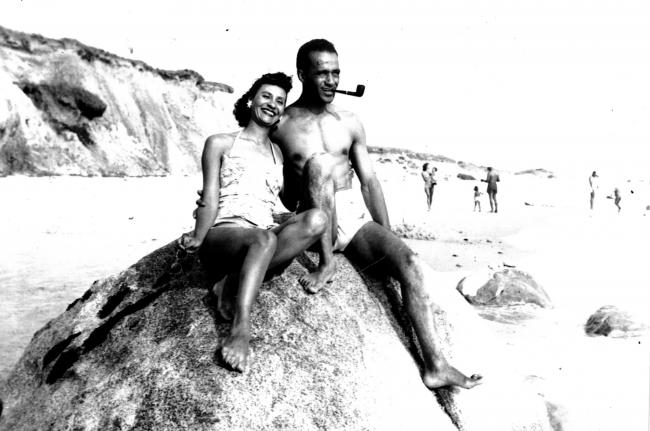


 1 comment
1 comment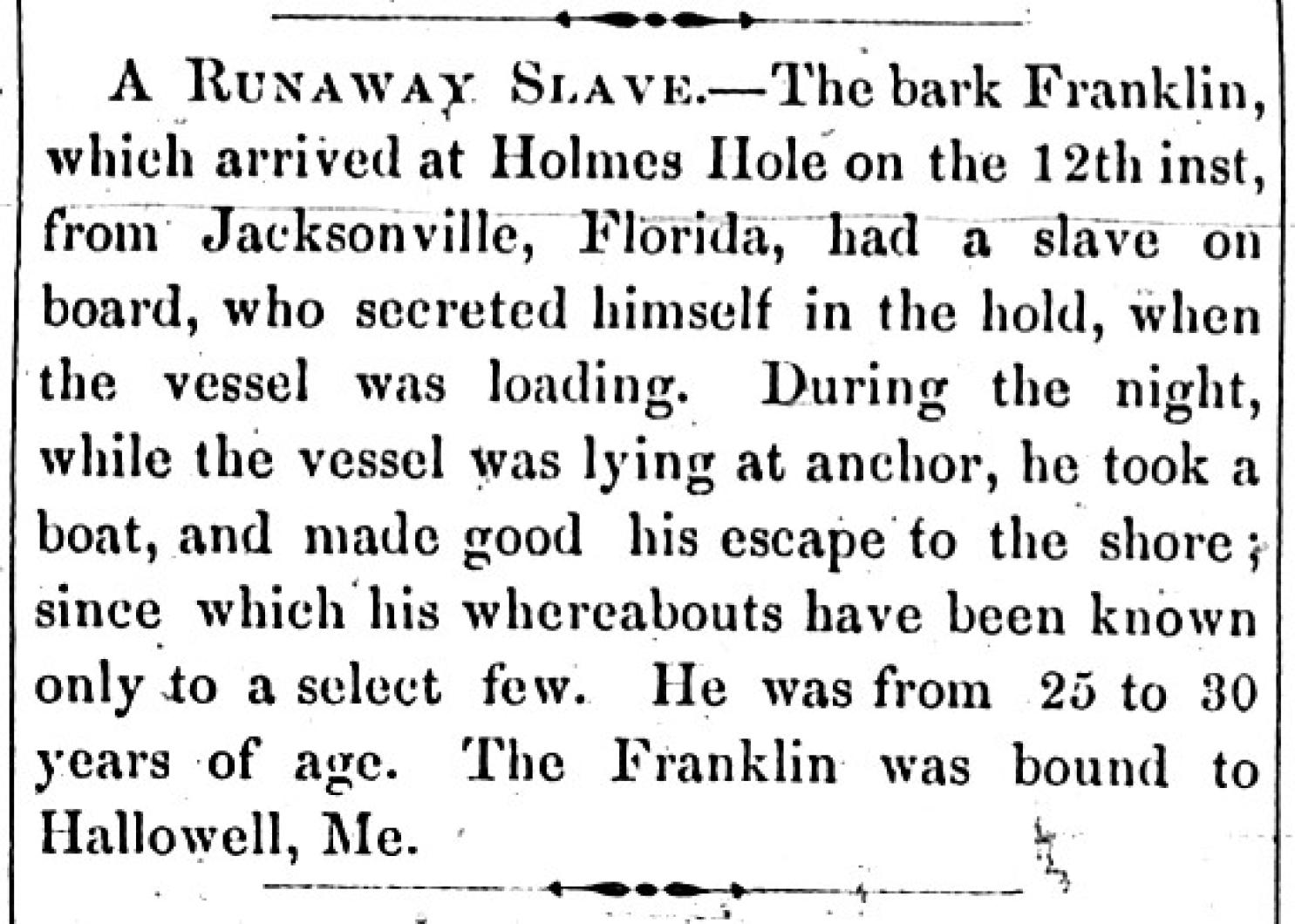
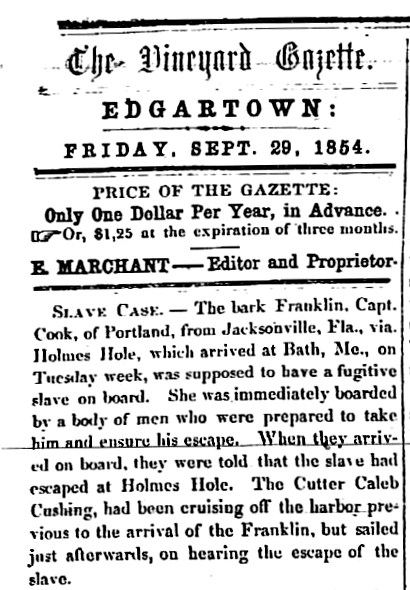

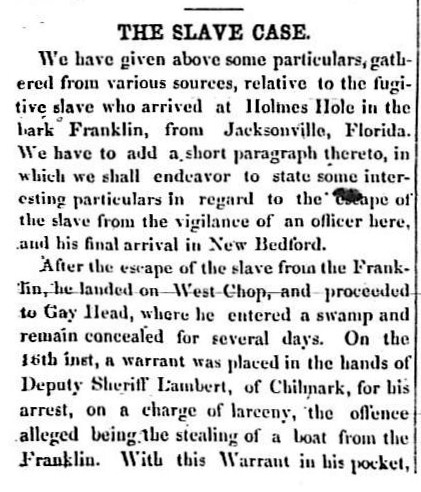

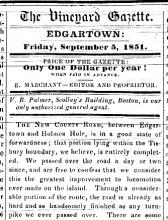
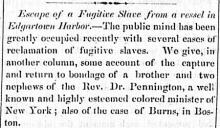
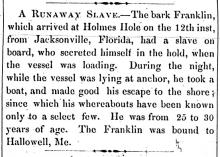
Comments (1)
Comments